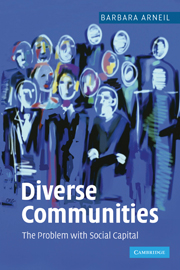Book contents
- Frontmatter
- Contents
- List of abbreviations
- Acknowledgements
- 1 Social capital, justice and diversity: an introduction
- 2 The Progressive Era: past paradise?
- 3 The present malaise in civic participation: empirical and normative dimensions
- 4 The causes of ‘decline’ in social capital theory
- 5 Civic trust and shared norms
- 6 Beyond Bowling Alone: social capital in twenty-first-century America
- 7 Justice in diverse communities: lessons for the future
- References
- Index
4 - The causes of ‘decline’ in social capital theory
Published online by Cambridge University Press: 22 September 2009
- Frontmatter
- Contents
- List of abbreviations
- Acknowledgements
- 1 Social capital, justice and diversity: an introduction
- 2 The Progressive Era: past paradise?
- 3 The present malaise in civic participation: empirical and normative dimensions
- 4 The causes of ‘decline’ in social capital theory
- 5 Civic trust and shared norms
- 6 Beyond Bowling Alone: social capital in twenty-first-century America
- 7 Justice in diverse communities: lessons for the future
- References
- Index
Summary
Having considered the evidence for a ‘decline’ in civic participation and assessed its validity for women, in particular, through a close examination of the eleven relevant civic associations, we turn to consider in this chapter the causes that Putnam suggests are behind the ‘collapse’ of American community. Given that the previous chapter concluded that there may not be a decline in civic participation at all so much as a change, one might well ask: why bother with Putnam's causal explanations at all? There are two reasons. First, in addition to the decline in participation, Putnam's analysis is also attempting to provide a causal explanation for a decline in trust (the other critical component of social capital). As the following chapter argues, while participation may only have changed, generalized trust has clearly declined; to the extent that Putnam's analysis might provide explanations for this decline (or not) makes my analysis of ‘causes’ in this chapter necessary. Secondly, it is important to analyse these causal explanations in their own terms to see if they hold together logically based on the studies provided (television), to compare them in relation to competing theories (generational change) and to make explicit any assumptions implicit within the analysis that might have an adverse impact on women or cultural minorities (dual-career families).
- Type
- Chapter
- Information
- Diverse CommunitiesThe Problem with Social Capital, pp. 92 - 123Publisher: Cambridge University PressPrint publication year: 2006



